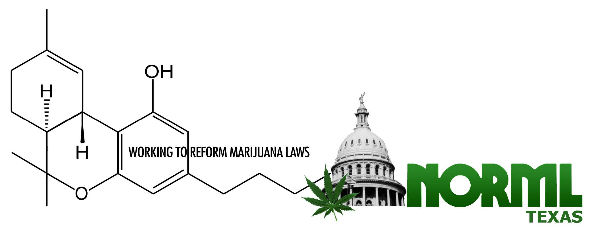
Reefer Madness takes over Austin!
June 2, 201310 Facts Everyone Should Know About Marijuana by Texas NORML
July 28, 2013Denver, CO:
Democrat Gov. John Hickenlooper has signed legislation into law regulating the commercial production and retail selling of marijuana to those age 21 or older.
Colorado is the first state to approve regulations authorizing a legal cannabis market for adult consumers.
State-licensed cannabis retailers are expected to be approved under the new law by early 2014. Marijuana retailers must be Colorado residents. Cannabis sales will be permitted to anyone over age 21, including non-residents.
Voters will decide on proposed tax rates for commercial cannabis production and retail sales this fall.
Salem, OR:
State lawmakers have approved legislation, Senate Bill 281, to allow patients with post-traumatic stress to be eligible to engage in the therapeutic use of cannabis.
Members of the Oregon House of Representatives voted 36 to 21 in favor. Senators had previously endorsed the bill in April by a 19 to 11 vote. The measure now goes before Democrat Gov. John Kitzhaber for consideration.
The bill expands the existing medical marijuana program to include post-traumatic stress as a state-qualified illness for which marijuana may be recommended.
To date, only three states – Connecticut, Delaware, and New Mexico – specifically allow for the use of cannabis to treat symptoms of post-traumatic stress.
Clinical trial data published in the May issue of the journal Molecular Psychiatry theorized that cannabinoid-based therapies would likely comprise the “next generation of evidence-based treatments for PTSD (post-traumatic stress disorder).”
Tabriz, Iran:
The consumption of hemp seed nutritional oil, in conjunction with the intake of evening primrose oils and a restricted diet high in hot-natured foods (such as pepper) and low in saturated fats and sugars, is associated with “significant improvement” in symptom management and immunological characteristics in subjects with multiple sclerosis (MS), according to clinical trial data published in the current issue of the scientific journal BioImpacts.
Hemp seed oil possesses potent antioxidative properties and also likely acts on specific signaling pathways that regulate inflammatory responses – two characteristics that would presumably make it beneficial in the treatment of MS.
Authors concluded: “After six months, significant improvements in extended disability status score were found. … Our data demonstrated that co-supplemented hemp seed and evening primrose oils with hot-natured diet intervention may decrease the risk of developing MS.”
The impact of inhaled cannabis and extracted organic cannabinoids in patients with MS have demonstrated that plant cannabinoids can alleviate disease symptoms and, in some subjects, may actually moderate disease progression. Nonetheless, the National MS Society shares little enthusiasm for the therapeutic use of either cannabis or cannabis-derived products as a treatment option for MS patients, stating on its website: “[B]ased on the studies to date – and the fact that long-term use of marijuana may be associated with significant, serious side effects – it is the opinion of the National Multiple Sclerosis Society’s Medical Advisory Board that there are currently insufficient data to recommend marijuana or its derivatives as a treatment for MS symptoms.”
Lansing, MI:
The Michigan Supreme Court has determined that state-authorized medical cannabis patients possess legal protections from criminal prosecution in cases involving the internal possession of THC while driving.
In (People v Koon), patients who are compliant with the Michigan (MMMA) may not be criminally convicted of being ‘under the influence’ absent evidence of behavioral impairment. Michigan traffic safety laws classify the operation of a motor vehicle with any amount of THC in one’s system to be a criminal offense, regardless of whether or not they are impaired by the substance.
The state’s zero tolerance per se drug law remains applicable to non-patients.
United States National Highway Transportation and Safety Administration (NHTSA): “It is difficult to establish a relationship between a person’s THC blood or plasma concentration and performance impairing effects. … It is inadvisable to try and predict effects based on blood THC concentrations alone.”
In addition, a 2013 academic review of per se drugged driving laws and their impact on road safety found “no evidence that per se drugged driving laws reduce traffic fatalities.”
According to the County and District Attorney website, there is no per se limit in Texas. They would need to prove impairment at the time.
Carson City, NV:
After passing by more than 2/3 in both Chambers , Republican Gov. Brian Sandoval has signed legislation, Senate Bill 374, authorizing for the creation of up to 66 medical marijuana production and distribution facilities.
Under the new law, state regulators will oversee the creation of licensed establishments to produce, test, and dispense cannabis and cannabis-infused products to authorized patients. Nevada voters enacted a state constitutional amendment in 2000 mandating state lawmakers to allow for physicians to authorize qualified patients to consume and grow cannabis. However, that law did not provide for facilities where patients may obtain medicinal cannabis.
Senate Bill 374 imposes limits on the home cultivation of cannabis if patients reside within 25-miles of an operating dispensary. However, patients who are cultivating specific strains of cannabis not provided by a local dispensary may continue to engage in the home cultivation of such strains. Patients who have an established history of cultivating medical cannabis prior to July 1, 2013, also may continue to do so until March 31, 2016.
The bill also amends possession limits from one-ounce to two and one-half ounces and increases plant cultivation limits from three mature plants to twelve.
Medical marijuana products dispensed by state-licensed facilities will be subject to standard state sales taxes as well as a 4 percent excise tax, of which 75 percent will be directed to education and 25 percent will be directed toward implementing and enforcing the regulations.
Denver, CO:
Democrat Gov. John Hickenlooper signed legislation, Senate Bill 241, into law creating a new program within the Department of Agriculture to oversee the regulation of commercial hemp production.
Senate Bill 241 classifies cannabis possessing no more than three-tenths of one percent THC as an agricultural commodity and establishes a nine-member committee within the state Department of Agriculture to oversee the creation of regulations governing the licensed cultivation of hemp for commercial and research purposes. The Department must adopt regulations for the new program no later than March 1, 2014.
SB 241 does not mandate farmers seeking state-issued hemp cultivation licenses to first gain federal approval. The US Controlled Substances Act makes no legal distinction between marijuana and industrial hemp.
Federal legislation, the Industrial Hemp Farming Act of 2013, to amend the Controlled Substances Act to exclude industrial hemp from the definition of marijuana is currently pending before Congress.
Montpelier, VT:
Democrat Gov. Peter Shumlin signed legislation into law eliminating criminal penalties for adults who possess personal use amounts of cannabis and/or hashish.
The new law amends penalties for the possession of up to one ounce of marijuana and/or marijuana paraphernalia by a person 21 years of age or older from a criminal misdemeanor (punishable by up to six-months in jail and a $500 fine) to a civil fine only – no arrest, no jail time, and no criminal record. The law also decriminalizes possession of less than five grams of hashish.
Vermont’s new law takes effect on July 1, 2013. They will be the 17th state to end criminal sanctions on Possession.
Las Vegas, NV:
Attendees at the 81st annual United States Conference of Mayors voted this week in favor of a resolution urging the federal government to stop interfering in the affairs of states that have legalized the use of cannabis. Mayors from some 200 US cities nationwide participated in the vote.
The measure resolves, “[S]tates and localities should be able to set whatever marijuana policies work best to improve the public safety and health of their communities,” and calls for amending the federal Controlled Substances Act “to explicitly allow states to set their own marijuana policies without federal interference.” It further calls on the Obama administration “to reexamine the priorities of federal agencies to prevent the expenditure of resources on actions that undermine the duly enacted marijuana laws of states.”
Approved unanimously.
Honolulu, HI:
Democrat Gov. Neil Abercrombie this week signed two separate measures into law to amend the state’s 13-year-old medical marijuana program.
House Bill 668 transfers the administration of the state’s medicinal cannabis program from the Department of Public Safety to the Department of Public Health. Senate Bill 642 increases the quantity of medical cannabis that may be possessed by patients from three ounces to four ounces. The measure also increases the total number of mature plants that may be legally grown by qualified patients at any one time from three to seven.
The changes in law become effective in January 2015.
Morgantown, WV:
THC possesses gastroprotective qualities and could potentially reduce incidences of NSAID (non-steroidal anti-inflammatory drugs)- induced hospitalizations, according to preclinical data published online in the European Journal of Pharmacology.
West Virginia University assessed the impact of THC administration in an animal model of NSAID-induced gastric inflammation. They reported that low doses of THC provided gastroprotective effects, such as attenuating gastric hemorrhages and lesions, and reducing ulcers.
Researchers concluded: “The results of the present study suggest that delta-9-THC … may also possess gastroprotective effects in NSAID using patients. … As current antacid regimens may be associated with undesirable effects, … other approaches to prevent NSAID-induced gastric ulcers are needed. In addition to their gastroprotective effects, cannabinoids produce other beneficial effects, including pain reduction. … Thus, cannabinoids may have the added benefit of reducing the effective analgesic dose of NSAIDs, as well as reducing the incidence of NSAID-induced gastric ulcers.”
NSAIDs such as ibuprofren are among the most widely used analgesic substances in the world, but their consumption is associated with various adverse and life-threatening side-effects such as heart-attack, stroke, and internal bleeding. According to a 2001 study conducted by the University of Illinois College of Medicine, in the United States, “gastrointestinal complications induced by nonsteroidal anti-inflammatory drugs (NSAIDs) cause more than 100,000 hospitalizations and an estimated 16,500 deaths.

